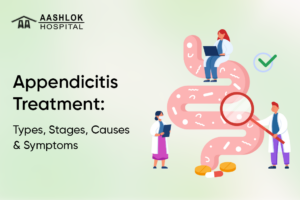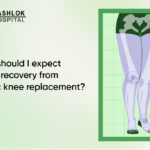Appendicitis Treatment: Types, Stages, Causes and Symptoms

Appendicitis is a condition that affects people of all ages and can lead to serious health complications if not treated
promptly. Appendicitis happens when a small pouch called the appendix gets inflamed, fills with pus, and becomes
infected. Recognizing the symptoms of appendicitis in adults, understanding the different causes, and learning about the
available treatment options can help you get help quickly and avoid serious problems.
At Aashlok Hospital, we prioritize your health and offer modern treatments for appendicitis. Our advanced diagnostic
tools and minimally invasive surgical techniques ensure accurate care with quicker recovery times.
Different Types of Appendicitis
Appendicitis can happen in different forms. Recognizing these types is essential for effective treatment. With over 10
years of experience, our specialists will diagnose the type of appendicitis you may have and provide the best-suited
treatment accordingly.
Acute Appendicitis
Acute appendicitis is the most common form and occurs suddenly. It is a condition where the appendix gets severely
swollen, and it can cause bad stomach pain, nausea, and fever. If not treated quickly, the appendix can burst, which can
lead to some serious health issues.
Chronic Appendicitis
Chronic appendicitis is a rare form where inflammation continues over a long period. The symptoms are often milder and
less specific. It’s often harder to diagnose than acute appendicitis, but treatment usually involves surgery to remove
the appendix.
Recurrent Appendicitis
Recurrent appendicitis is when the appendix gets inflamed repeatedly. The symptoms may go away for a while but reappear
later. This condition requires immediate appendicitis treatment, usually surgery to remove the appendix.
Causes of Appendicitis
Appendicitis is caused by a blockage or obstruction in the appendix, which leads to infection and inflammation. The main
appendicitis causes include:
Blockage
A blockage in the appendix can occur due to various reasons, such as hardened stool (fecalith), foreign bodies, or
tumors. When the appendix is blocked, bacteria can multiply and cause inflammation, leading to appendicitis.
Infections
Gastrointestinal infections, such as bacterial or viral infections, can cause inflammation and swelling of the
appendix. These infections can spread to the appendix through the bloodstream or the digestive tract. Common
infections that can cause appendicitis include gastroenteritis, diverticulitis, and inflammatory bowel disease.
Inflammatory bowel diseases
Conditions like Crohn’s disease or ulcerative colitis can increase the risk of appendicitis due to chronic
inflammation in the digestive tract. These conditions can cause the appendix to become inflamed, leading to
appendicitis.
Abnormal intestinal movement
It is a significant factor among appendicitis causes. Abnormal movement of food and waste through the intestines can
increase pressure on the appendix. This can cause the appendix to become inflamed, leading to appendicitis.
Conditions such as irritable bowel syndrome (IBS) or gastrointestinal motility disorders can cause abnormal
intestinal movement and increase the risk of appendicitis.
Symptoms of Appendicitis
Symptoms of appendicitis can vary between individuals. Below are the common symptoms of appendicitis in adults:
- Severe abdominal pain: Pain starts around the navel and shifts to the lower right abdomen. It increases with
time and movement. - Nausea and vomiting: These symptoms often occur with abdominal pain.
- Loss of appetite: A sudden lack of interest in eating is a common sign of appendicitis.
- Abdominal tenderness and swelling: The lower right abdomen becomes sensitive to touch and may appear
swollen.
Stages of Appendicitis
Appendicitis progresses through various stages, and knowing about them helps in determining the appropriate
treatment. Understanding the different appendicitis causes for each stage can further improve treatment outcomes. At
Aashlok Hospital, our experienced doctors will guide you through the diagnosis and treatment process for quick
recovery from the ailment.
Early Stage
In the early stage, the appendix becomes mildly inflamed. Pain is manageable, but if untreated, inflammation can
worsen. Diagnosing appendicitis at this stage allows for effective treatment with minimal complications.
Suppurative Stage
During the suppurative stage, the appendix swells and fills with pus. The pain becomes more intense. Surgical
removal of the appendix is usually required at this stage to prevent further complications.
Gangrenous Stage
The gangrenous stage occurs when the blood supply to the appendix is cut off, causing tissue death. The risk of
rupture significantly increases, and patients may experience severe pain and a rapid decline in health.
Perforated Stage
At this stage, the appendix bursts, releasing infectious material into the abdominal cavity. This can lead to
peritonitis (severe abdominal infection). Emergency surgery is required to clean the abdominal cavity and remove the
appendix.
Effective Appendicitis Treatment
Treatment for appendicitis typically involves surgical or non-surgical approaches, depending on the stage and
severity of the condition. At Aashlok Hospital, we carefully evaluate each patient’s condition to determine the most
appropriate treatment plan.
Surgical Treatment Options
Appendicitis surgery has two main surgical approaches. The choice of surgery depends on the severity of the
condition and the individual patient’s needs.
Open Appendectomy
An open appendectomy involves making a single large incision in the abdomen to remove the appendix. This method is
usually performed in cases of a ruptured appendix or when complications such as abscesses are present. Although
recovery takes longer than other methods, it is a reliable option for severe cases.
Laparoscopic Appendectomy
A laparoscopic appendectomy is a minimally invasive procedure that uses small incisions and a camera-guided
instrument to remove the appendix. This technique offers several advantages, including shorter hospital stays, less
scarring, and faster recovery. At Aashlok Hospital, our surgeons utilize the latest laparoscopic techniques to
ensure patient comfort.
Non-Surgical Treatment Options
Non-surgical treatments can be effective for some patients. It’s essential to consult with a medical professional to
determine the best treatment.
Antibiotics
In some cases, particularly during the early stages of appendicitis, antibiotics may be used to treat mild
inflammation. This approach is less invasive and can be effective for certain patients.
Drainage of Abscess
If an abscess forms around the appendix, it can be drained using an ultrasound or CT scan. This procedure helps
control infection and is often followed by surgery to remove the appendix.
Recovery Process and Post-Operative Care
Recovery from appendicitis treatment depends on the type of procedure and the patient’s overall health. Here are key
aspects of the recovery process:
- Hospital Stay: Patients undergoing laparoscopic surgery are often discharged within a day, while those with
open surgery may require a longer hospital stay. - Pain Management: Post-operative pain is common but manageable with prescribed medications.
- Dietary Changes: Patients are advised to start with light meals and gradually reintroduce solid foods as
they recover. - Follow-Up Care: Regular check-ups help in proper healing and find any complications early.
At Aashlok Hospital, we prioritize patient comfort and provide comprehensive postoperative care to support a smooth
recovery process.
Conclusion
Timely medical help is vital for treating appendicitis. Seek immediate care to avoid complications and recover
quickly. At Aashlok Hospital, we are committed to
offering advanced, patient-focused care for appendicitis treatment. With advanced facilities and expert
professionals, we ensure accurate diagnoses, effective treatment, and faster recovery times. Trust us for your
healthcare needs and regain your quality of life.
FAQs
1. What is the first stage of appendicitis?
The first stage of appendicitis is characterized by mild inflammation of the appendix, typically the lower right
abdomen.
2. What is the cause of the appendix?
The appendix is an organ attached to the large intestine. Appendicitis happens when the appendix gets inflamed or
infected.
3. What is the recovery time for appendicitis surgery?
Recovery time varies. For laparoscopic surgery, most patients recover in 1-2 weeks, while open surgery may take 3-4
weeks.
4. How serious is appendix removal surgery?
Appendix removal surgery is generally safe. Laparoscopic appendectomy is minimally invasive and has a low risk of
complications.









